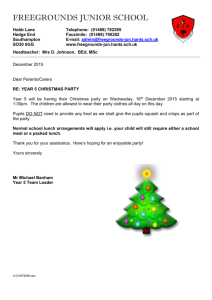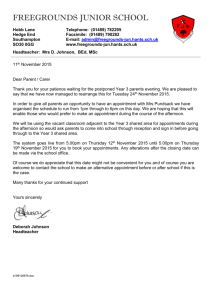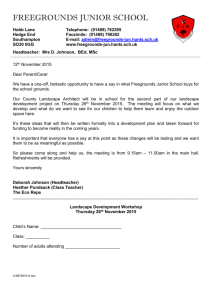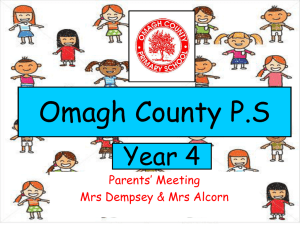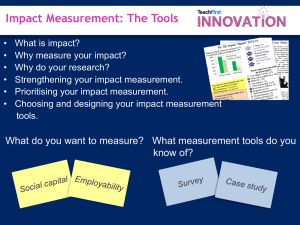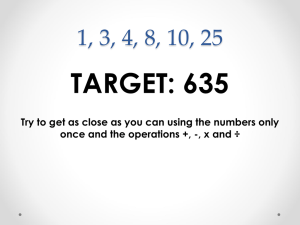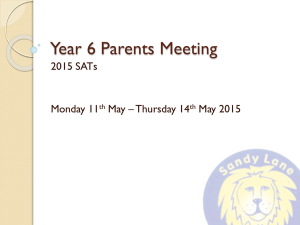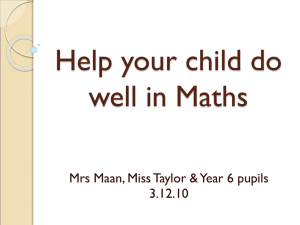Year 7 - Perins School
advertisement
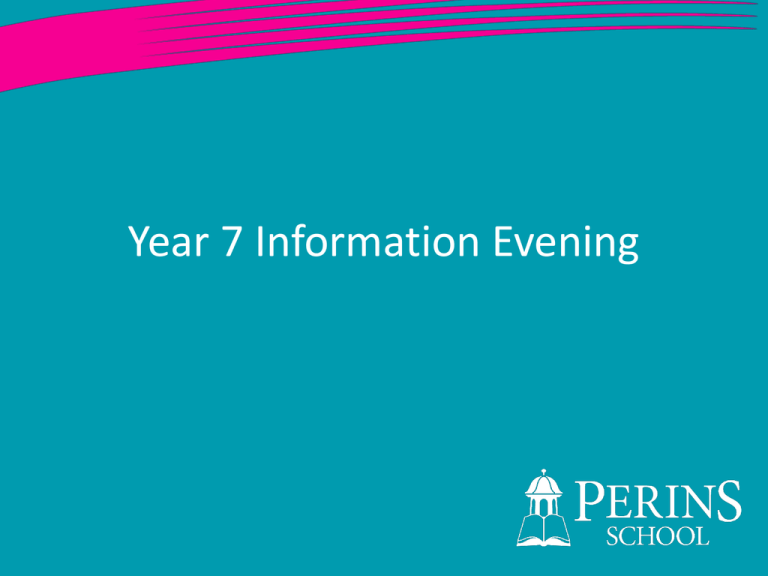
Year 7 Information Evening Introduction • Overview of Year 7 – Paula Kennedy KS3 Manager and AHT • English – Brita Yates • Maths – Alexei Western • Science – Sarah Henderson • FOP – at the back of the hall • A reminder of where to find this information Opportunities to come into school • The Core information evening To come this term: • 11th November meet the tutor • 1st December one to one review day • 16th Christmas concert (St John’s Alresford) Reporting • • • • • Due to get a short report on 21st November One to one day on 1st December Second short report in the Spring term Full report in the Summer term Parents evening tbc Perins Gateway • Parents have been sent names & passwords at the start of October. Perins Gateway Classes • After half term students will be placed in • Sets for Maths (1-4) • Groups for English (colours) Why? • More and more emphasis on these skills for GCSE. Place students into groups to focus on knowledge and skills. • Groups will be in the students’ half of the year so will not affect other lessons. • Allows more flexibility than before , teachers can move students between sets when appropriate to the child. Classes In January – the other classes will also move into different groups. Science will set (1-4) Humanities loosely set. ICT set with humanities. (1-4) Drama, PE, DT, Art, Music, MFL all mixed groups to get the best out of the students. Students will remain in their English and Maths sets Changes to GCSEs Terminal exams. Controlled assessment in Sciences How to support your child. • • • • • • Home work or IL - IL club available every day Acting on feedback Study skills Equipment Home school relationship The extras Transformational learning What skills do employers desire? CBI: Confederation of British Industry. First Steps report What is it that small, medium and large companies need young people to bring with them into the world of work? – that’s not just exam results. ‘It’s actually about the characteristics, values and habits that last a lifetime. Businesses thrive working with young people who are determined, optimistic and emotionally intelligent,’ so the education system must focus on ‘helping them to be rigorous, rounded and grounded. What skills do employers desire? CBI: Confederation of British Industry. First Steps report What is it that small, medium and large companies need young people to bring with them into the world of work? – that’s not just exam results. ‘It’s actually about the characteristics, values and habits that last a lifetime. Businesses thrive working with young people who are determined, optimistic and emotionally intelligent,’ so the education system must focus on ‘helping them to be rigorous, rounded and grounded. Skills for life-long learning •Contents •Qualifications •Mental Skills & Attitudes? Your child may be going into a job that does not yet exist! 3 lessons Every Monday Whole year group Mixed Ability 1 Teacher each class Real Projects! (society moves faster than the curriculum) Self Manager Progression • Make a list of the tasks I have to do Basic • Check the time regularly to makes sure I know how much I have left • Use other people to help keep me on task • Create a plan to prioritise my time and tasks Better Best • Persevere when things don’t go the way I planned • Be thoughtful and consider other people’s feelings when I make comments and decisions • Review and edit my plan of priorities during a project • Be confident in taking risks, by weighing up all the advantages and disadvantages • Change my approach to motivate others to overcome problems 7billionideas Future Schools Huminal Rights Sweetshop Enterprise Connect with Respect English Brita Yates Year 7 English Information During the course of this year your child will: Follow a number of different Modules in English: • READ related stories, plays and poetry; • RESEARCH into a related topic; • STUDY aspects of language and style; • WRITE in a wide variety of ways (e.g. stories, poems, descriptions, articles;) • SPEAK in a variety of situations • LISTEN to adults and other students for a variety of reasons; • USE audio and audio-visual devices, word processors, research software, databases, desktop publishing programs, Moodle and access the Library at all times. What happens in lessons? English Year 7 Curriculum • Autumn Term 2014 • Who are you? – transition unit from Primary School; focus on Speaking & Listening • Non-fiction: Animals – the focus is on Writing with some reading • Poetry: Emotions – the focus is on Reading and speaking & listening • Spring and Summer Terms 2015 • Narrative: Ancient Myths • Description: Heroes and Villains • Shakespeare: Macbeth • In depth study of a classic novel The classic novels we study: • Year 7 – Charles Dickens • Great Expectations • A Tale of Two Cities • Oliver Twist • Year 8 • • • • • Pride and Prejudice War of the Worlds The Lost World Hound of the Baskervilles Sherlock Holmes stories • Year 9 • • • • Far from the Madding Crowd Silas Marner Emma Wuthering Heights Moodle All of the English modules are on our VLE, Moodle, to which you have Guest Access – or you can ask your son or daughter to take you on a guided tour! How does Accelerated Reader work? • All Year 7s are enrolled on the Accelerated Reading programme through the Library (they also have a private reading session during one tutor time a week and a dedicated reading time in their English lessons.) • Accelerated Learning is a programme of small group lessons set up by the English Department to support those pupils who are Level 4 in general but have a specific Level 3 in Reading or Writing with the aim to integrate them into full classes as soon as they are a secure Level 4 • Those pupils on Level 3 and below are supported through the Learning Support Department What about homework? • Homework is set regularly through the Department and takes the form of: – Set tasks: Knowledge about language homework sheets on Moodle (grammar for want of another name!) – may work through at their own pace, expected one per fortnight – Reading reviews through the Library – expect one per halfterm – Specific pieces of work, related to class work, set by their English teachers – Students will be expected to read widely and to record their responses. Children should aim to read ten novels during Year Seven. APP – what’s that? • Assessing Pupils’ Progress – a system of continuous assessment which is a mixture of formative assessment through daily classwork as well as summative assessments at key times in the year (e.g. November to aid banding) • Each term – Assessments are undertaken dependent upon which module children are studying – these cover: Reading, Writing and Speaking & Listening with equal diligence – A half-termly Reading Comprehension with an element on Literacy accuracy Assessment cont. • Students will be encouraged to assess their own development. • Students will be encouraged to comment constructively on each other’s work. • Teachers will highlight successful parts of students’ work and identify areas requiring improvement. • Together the student and teacher will set targets for improvement. What about results? • Perins Gateway allows access to the most current level in Reading, Writing and Speaking & Listening • Year 7 are set yearly target levels based on their CATS results and KS2 levels • Pupils should progress two sub-levels each year • Termly and half-termly checks of individual progress are made by senior staff and within the department to check pupils are on track to meet their targets Reading – it’s harder! • No longer are pupils assessed on AF1 – Use a range of strategies, including accurate decoding of text to read for meaning • Assessing Reading in Year 7 has a greater focus on AFs 4 & 5 and is through written responses – 4: Identify and comment on the structure and organisation of texts, including grammatical and presentational features at text level – 5: Explain and comment on writers’ use of language, including grammatical and literary features at word and sentence level FAQs • My child doesn’t appear to have much homework Homework is set regularly – check SMH, contact your child’s teacher or contact me • My child appears to have stuck on Level 5. They change up a gear in texts and a greater focus on some AFs often give the appearance that your child has stalled; don’t worry, they are honing the skills learned in Primary school. Very often the largest leaps in Language levels happens in Year 9. • My child seems to have stopped reading. This is quite common when starting secondary schools with the increase in subjects studied. All children are encouraged to read independently but be reassured that they will read at least three novels/sets of short stories and a Shakespeare play every year in Key Stage 3 plus they will be encouraged to read widely using the Accelerated reader program. • My child seems to do most of the work on a computer. As an e-learning school we believe in the value of using contemporary technology working hand-in-hand with further development of the necessary skills of writing by hand - therefore we expect a number of the assessments (and all the Reading Comprehensions) to be completed by hand. What does this mean for you? • Support their reading – check Accelerated Reader on-line – read with them • Look at Show My Homework • Support them with homework – but please don’t do it for them • Keep in contact – this is a partnership! • If they let you - - -! read their work to see what they are doing and comment in your child’s exercise book • Be sure they have the correct equipment Children will need a fountain pen/biro( blue or black and red), colouring pencils, highlighters, a ruler, and an eraser. English teachers in Year 7 Feel free to contact us should a problem or query arise. Email is our preferred method of communication: English Group English Class teacher Contact point 7C1 7C2 7C3 7D1 7D2 7D3 7E1 7E2 Mrs Yates Mrs Crafford Miss Hallett Mr Barber Mrs Yates Miss Hallett Miss Cross Miss Scott yates@perins.hants.che.uk crafford@perins.hants.sch.uk hallett@perins.hants.sch.uk barber@perins.hants.sch.uk yates@perins.hants.sch.uk hallett@perins.hants.sch.uk cross@perins.hants.sch.uk scott@perins.hants.sch.uk Colin Forrest-Charde charde@perins.hants.sch.uk Maths Alexei Western Year 7 The maths team • Mr Western • Miss Griffin • Mr Locke • Mrs Wadey • Mrs Exley • Miss Chahal • Mrs Miller • Miss Ball • Mrs Palmer • Mr Nevola Year 7 in a ‘nutshell’ • Projects (using and applying) • Fluency of fundamentals • Streamed on ability from Autumn half term - KS2, Entry test, CATS, Teacher recs • ‘One step back a sideways stagger and 2 steps forward’ - Broader levels from KS2 • Assessments Maths outside of lesson time • Extra curricular – UKMT Maths Challenges – logical maths competition – Half termly competitions – Puzzle club – Homework help – Trips – STEM club Science Sarah Henderson KS3 Curriculum Course Structure • Science is split into the 3 Sciences: – Biology – Chemistry – Physics • • • • 6 modules per Science Each module is 10 lessons Test at the end of each module Taught over two years and first half term of Year 9 Course Structure Structured Levelled Questions Self Assessment Sheets APP: Assessing Pupil Progress Moodle Course http://moodle.perins.net/course/index.php?categoryid=894 End of unit tests QWC is now part of all GCSE units Prepare students for GCSE longer answer questions How can you help your child at home? • Ask them to explain what they have been doing in class • Use https://perinsschool.showmyhomework.co.uk /teacher to help support IL at home How can you help your child at home? • Use KS3 BBC bitesize: http://www.bbc.co.uk/schools/ks3bitesize/sci ence/ • Encourage them to watch science programs at home Home experiments • Carry out mini experiments at home – Marvin and Milo • http://www.physics.org/marvinandmilo.asp – Sciencebob • http://www.sciencebob.com/experiments/index. php – Steve Spangler Science • http://www.stevespanglerscience.com/lab/experi ments Finally….. Feedback on post its. All on our website. WWW EBI First three rows to Maths – Turing Block Next three rows to English – Library Rest to Science - Newton
